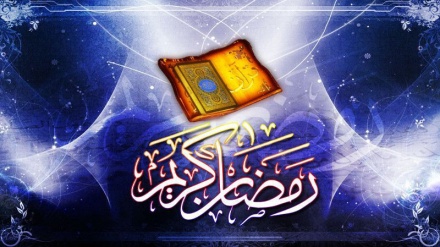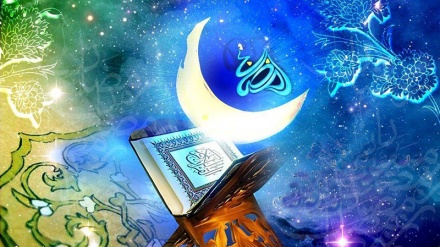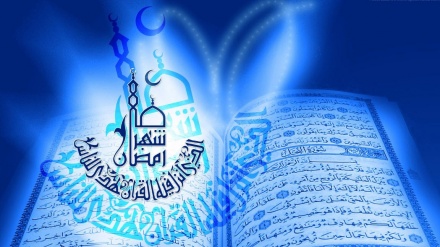The blessed Month of Ramadan
Divine blessings are bestowed on the servitudes of God in the holy month of Ramadan, more than ever, and the signs of these divine blessings are especially evident and tangible throughout the gatherings of Muslims. In fact, Muslims maintain beautiful traditions in the holy month of Ramadan, based on their religious beliefs, such as giving Iftari. This praiseworthy tradition is the legacy of the Prophet of Islam, Mohammad (Blessings of God upon him and his progeny).
A few moments are left until the evening Call for Prayers. Mother is making her utmost efforts to prepare Iftar. Family’s youngest daughter, Sara, seems vibrant and lively, while glancing at everything with a sense of curiosity. Father comes home; carrying loafs of bread, and looking cheerful. Grandparents, uncles and aunts were invited to their home, to break their fast in a kind and amicable atmosphere. When grandfather stood up, everyone else stood up too as a sign of respect and honor for him. He kindly looked at everyone. Maybe throughout those spiritual moments, he was praying to God for continuation of the close, amicable bond which was established among the family members. He raised his hands, and began to pray to God. This beautiful gathering has been etched in the memory of Sara, for good. She will most certainly keep up this beautiful tradition when she grows up.
The Prophet of Islam pointed out: “Save yourself from the fire of hell by giving Iftaris, even if it is a half a date and a sip of water.”
Giving Iftaris is one of the traditions which reinforce social relations and amicable bonds among Muslims. Islam is a religion based on kindness and amity, which puts emphasis on establishment and maintenance of relations among individuals, based on dignity, courtesy, and respect. The Prophet of Islam was highly kind and respectful toward others in his social relations. Whoever met the Prophet of Islam, admired his unique manners and characteristic traits. The Prophet of God in his encounters with people was very modest and cheerful.
Assisting others and/or gladdening others can come in different forms. At times, sympathizing with a friend can dispel his sorrows, and a minor generosity may solve a major problem of a needy person, instilling kindness in his soul and heart.
Prophet Mohammad pointed out three examples of gladdening others which are namely repaying a faithful’s debt, meeting his needs, and/or dispelling his sorrows.
The 74th and 75th ayahs of Holy Quran note: “Whoever comes to his Lord laden with guilt, indeed for him shall be hell where he will neither live nor die. But, whoever comes to Him with faith and he has done righteous deeds, for such shall be the highest ranks.”
This ayah depicts after the change of heart among the sorcerers of Pharaoh’s court, who established faith in Prophet Moses; and the vows Pharaoh made to these magicians. Pharaoh had promised to highly endear sorcerers in case of their victory over Moses. However, after these sorcerers brought faith in Moses, Pharaoh threatened to chop off their hands and legs and to hang them. The most important point in these ayahs is the swift and profound change of heart among these sorcerers; and their faith in Moses. In the very beginning, these sorcerers were the staunch enemies of Moses. However, upon observing his first miracle, they were shaken and awakened, changing their path, and astounding everyone. This change of path from disbelief to faith in God, and in other words, from darkness into the light, surprised everyone, including Pharaoh. So, Pharaoh tried in vain to somehow display this development as a premeditated conspiracy, while he knew perfectly well that such accusations are nothing but sheer lies.
What led to a profound and swift change of heart among these magicians was their newly-established vigilance and awareness. Sorcerers were well-informed about the techniques and secrets of their profession and had clearly realized that Moses was not a magician and had in fact performed a divine miracle. Thus, they changed their wrongful path with courage and resoluteness. So, from these ayahs one realizes that in order to guide deviated individuals and communities, first of all they should be awakened.
The other fact pointed out by these ayahs, is that all human beings are either summoned by God as sinners, or as the faithful. If they are sinners, they enter fire and if they are among the faithful ones, they enter Heaven.
The great mystic, Khajeh Abdullah Ansari notes: “This ayah refers to two groups. The first group has provoked the divine wrath. The other group is comprised of those, who are the manifestations of God’s kindness. These ayahs intend to awaken the servitudes of God.”
The final days of the holy month of Ramadan are concurrent with longer and warmer days, which in turn surges thirst and leaves body with a shortage of water. So we make a number of recommendations to fasters, who in these long summer days refrain from eating and drinking, setting their hopes on divine kindness and forgiveness.
Remember eating sour cherries in order to quench thirst. Sour cherries reduce thirst, purify blood, and soften and brighten the skin. Also consume apricots and peaches, given that they significantly alleviate pain resulting from stomach acid, and make up for minerals lost due to perspiration.
Drinking fruit juices and consumption of succulent vegetables and fruits can be very beneficial, replacing lost minerals. Citrus fruits and strawberries, in addition to provision of water, meet body’s need for calcium, fiber, iron, potassium, and other minerals, in addition to Vitamins C, B2, and B1. Succulent fruits such as water melons and yellow melons play an important role in provision of water for the body; and their consumption between Iftar and Sahari is highly recommended. Also, consumption of lime is effective in prevention of thirst and heatstroke. In order to prevent thirst, boil the dried leaves of mint and mix them with honey, making syrup which works miracles in quenching thirst. Note that consumption of tea for quenching thirst throughout Sahari is a mistake.
Meanwhile, traditional medicine recommends consumption of a plant called Portulaca OLeracea, as the best plant for quenching thirst. This plant is similar to fenugreek. According to the Iranian-Islamic genius, Avicenna, this plant quenches thirst, and its consumption is highly recommended during Sahari and Iftar in the holy month of Ramadan.
In many countries, including Arab countries, this plant is sold as an edible vegetable within greengroceries. Its distillate and/or squashed leaves and stems are used to remedy pains and burns, and to sooth inflammations.
MR/MG


